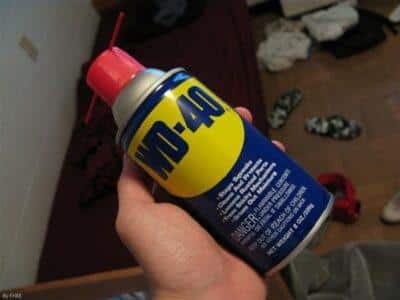There are certain products that have reached the point of fame where their brand name is commonly used as the generic name for the product. Kleenex, Band-Aid, Jell-O and Scotch tape are a few examples. Another one, maybe not quite as iconic, is WD-40.
WD-40 is actually the trademark name of a lubricating spray created in 1953. The WD in WD-40 stands for water-displacing spray, and the “40” stands for how many attempts it took to come up with a successful formula.
In 1953, staff members of the Rocket Chemical Company in San Diego, California, worked to create a line of rust-prevention solvents and degreasers for use in the aerospace industry. The solvent the researchers created on their 40th try was used by Convair, an aerospace contractor, to protect the exterior of the Atlas Missile from rust and corrosion. Legend has it that a few employees liked the product so much that they took some home.
A few years later Norm Larsen, the founder of Rocket Chemical Company, experimented with an aerosol formula, and WD-40 first appeared on the shelves of some San Diego stores in 1958. Today, WD-40 is a household name and is commonly used for all sorts of home and commercial applications.
Chances are you grew up seeing a can of WD-40 around your home or garage, and you may have used it yourself to lubricate hinges or to loosen sticky residue around your home or for a myriad of other uses.
According to U.S. Material Safety Data Sheet information, WD-40’s main ingredients are:
50 percent aliphatic hydrocarbons, 25 percent petroleum base oil, 12 to 18 percent low vapor pressure aliphatic hydrocarbon, 2 to 3 percent carbon dioxide, 10 percent inert ingredients.
When you consider those ingredients, you may think twice about using the product around your family. Since you are looking for ways to keep things natural around your home as well as to multi-purpose items in your home, here are some ideas for creating household lubricant using natural ingredients.
- Fill an 8 ounce spray bottle with one part water and three parts sunflower oil or olive oil. Shake to mix.
- Or another WD-40 alternative recipe is to combine 90 percent vegetable oil with 10 percent acetone. Although most vegetables oils are full of GMO ingredients, there are many different brands of non-GMO organic soybean oils, sunflowers oils and safflower oils. Acetone, commonly found in nail polish remover, is an organic compound with the formula (CH3)2CO. It is a colorless and flammable liquid, and is the simplest ketone.
A team at Philadelphia’s Drexel University compared vegetable oil mixture with WD-40 and found that a mixture of vegetable oil with 10 percent acetone – the ingredient in nail polish remover and some paint thinners — works as well or better to free rusted bolts as does WD-40.
Sounds simple, enough, right? Now here are a few ideas for this all-natural “miracle” spray beyond squeaky hinges:
- Remove and prevent rust on lawn mower blades
- Lubricate cookie sheets and baking pans
- Remove gum, glue, ink and sticky residue from decals
- Loosen nuts and screws
- Fix stuck zippers
- Remove toilet stains
- Lubricate guitar strings
- Keep flies off livestock
- Clean chalkboards
- Untangle jewelry chains
- Clean barbecue grills
- Remove shower door stains
- Lubricate scissors
- Remove scuff marks from flooring
- Keep dead bugs from accumulating on your car grill and bumper
- Clean and restore luster to car dashboard and interior
- Lubricate and stop squeaks in electric fans.
- Keep electric fans running smoothly and quietly
- Prevent rust accumulation on saws and other tools
- Discourage pigeons from congregating
- Remove crayon marks from walls
- Pre-treat lipstick stains on clothing before laundering
- De-ice door locks
- Soothe sore muscles and joints
- Keep squirrels off your bird feeder
- Unstick glasses that are stuck together
- Remove a stuck ring from your finger
- Repel insects, wasps and spiders
- Spray on chewing gum stick in hair. Comb out.
- Clean license plates
- Remove dog poop from shoes. (Spray, then rinse with water.)
- Protect a boat’s surface
- Keep snow from sticking to a shovel
- Untangle a fishing line
- Remove burs from an animal’s hair
- Clean driveway oil spills (Spray on, then rinse with water)
With all-natural “WD-40,” you may never go back to the original formula again.
Sign up for Off The Grid News’ weekly email and stay informed about the issues important to you
 Off The Grid News Better Ideas For Off The Grid Living
Off The Grid News Better Ideas For Off The Grid Living






